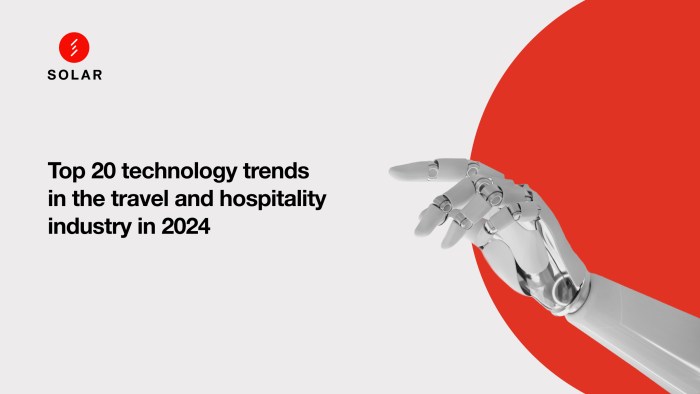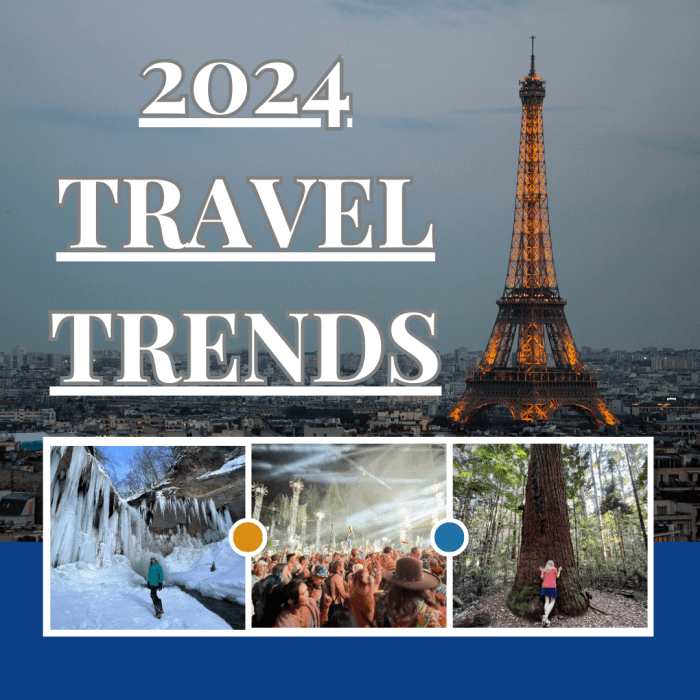2024s most important travel tech trends – 2024’s most important travel tech trends are poised to revolutionize the way we plan, book, and experience travel. From hyper-personalized itineraries to seamless contactless experiences, technology is rapidly transforming the travel industry, creating a future that’s both more convenient and more sustainable.
These trends are not just about making travel easier; they’re about enhancing the entire travel experience. Imagine a world where your travel preferences are anticipated before you even express them, where you can navigate airports and hotels with the ease of a smartphone, and where sustainable choices are effortlessly integrated into your journey.
This is the future of travel, and it’s powered by technology.
The Rise of Hyper-Personalization

The travel industry is undergoing a digital transformation, with technology playing a pivotal role in shaping the future of travel experiences. At the forefront of this evolution is the rise of hyper-personalization, driven by advancements in artificial intelligence (AI) and data analytics.
Travel tech companies are leveraging these technologies to deliver highly tailored experiences that cater to individual preferences, past travel history, and real-time data.Hyper-personalization is about creating a travel experience that feels unique and curated for each traveler. It’s about understanding individual needs and preferences, and using that knowledge to create a journey that is truly meaningful and memorable.
Tailoring Recommendations and Itineraries
Travel companies are using AI to analyze vast amounts of data, including user profiles, past travel history, social media activity, and even real-time location data. This information is then used to generate personalized recommendations for destinations, activities, hotels, and even dining options.
For example, a travel platform might recommend a specific hiking trail based on a user’s past interest in outdoor activities and current location. Or, a hotel booking site could suggest a boutique hotel in a specific neighborhood based on a user’s preference for unique and local experiences.
Dynamic Pricing and Personalized Offers
Hyper-personalization is also being used to optimize pricing and offer personalized deals. AI algorithms can analyze data about a traveler’s booking history, travel patterns, and even their willingness to pay to determine the optimal price for a particular trip. This allows travel companies to offer dynamic pricing that is tailored to each individual traveler, while still ensuring profitability.For example, a flight booking platform might offer a discounted fare to a traveler who has previously booked flights with the same airline, or a hotel might offer a free upgrade to a loyal customer.
The Impact on Traveler Satisfaction and Engagement, 2024s most important travel tech trends
Hyper-personalization has the potential to significantly enhance traveler satisfaction and engagement. By providing personalized recommendations, itineraries, and offers, travel companies can create a more seamless and enjoyable travel experience. This can lead to increased customer loyalty and repeat business.For example, a travel agency might offer a curated itinerary that includes activities and destinations that are specifically tailored to a traveler’s interests.
This would likely lead to a more enjoyable and memorable trip, increasing the likelihood that the traveler will book with the same agency in the future.
Sustainable Travel Solutions

The travel industry is increasingly aware of its environmental impact, and technology is playing a crucial role in helping travelers make more sustainable choices. From carbon footprint calculators to eco-friendly accommodation options, travel tech is empowering individuals to minimize their footprint and enjoy responsible travel experiences.
Carbon Footprint Calculators and Sustainable Accommodation Options
Carbon footprint calculators are a valuable tool for understanding the environmental impact of travel. These online tools allow travelers to estimate the emissions associated with their flights, car journeys, and accommodation choices. This information can help travelers make informed decisions and opt for more sustainable travel options.
For instance, choosing a train journey over a flight or selecting accommodation with eco-friendly certifications can significantly reduce carbon emissions.
Eco-Tourism Experiences and Sustainable Travel Practices
Travel tech is also facilitating the growth of eco-tourism experiences. Online platforms and travel agencies are showcasing sustainable tourism options, such as wildlife sanctuaries, nature reserves, and community-based tourism initiatives. These experiences often prioritize environmental conservation, cultural preservation, and responsible travel practices.
Obtain a comprehensive document about the application of mistral ai secures 105m europes largest ever seed round that is effective.
For example, travel tech platforms can connect travelers with local guides who promote sustainable practices, ensuring minimal impact on the environment and local communities.
Impact of Technology on Reducing Environmental Footprint
The adoption of sustainable travel technology has a positive impact on reducing the environmental footprint of travel. By providing travelers with tools and information to make informed choices, travel tech empowers them to make more responsible decisions. For instance, carbon footprint calculators encourage travelers to consider alternative modes of transportation, while platforms promoting eco-tourism experiences encourage responsible travel practices.
The Metaverse and Virtual Travel

The metaverse is poised to revolutionize travel, offering immersive experiences that blur the lines between the real and virtual worlds. With the integration of virtual reality (VR) and augmented reality (AR), travelers can explore destinations, plan trips, and even engage in travel activities from the comfort of their homes.
Virtual Travel Experiences
Virtual reality and augmented reality technologies are transforming how people plan and experience travel. These technologies offer a unique opportunity to explore destinations from the comfort of one’s home.
- Virtual Tours of Destinations:VR experiences allow users to virtually visit iconic landmarks, museums, and natural wonders around the world. Imagine taking a virtual stroll through the Colosseum in Rome or exploring the Great Barrier Reef without leaving your living room.
- Interactive Travel Guides:AR can enhance travel planning by overlaying information onto the real world. Imagine pointing your phone at a street in Paris and seeing real-time reviews of nearby restaurants, shops, and attractions. AR travel guides can provide personalized recommendations and directions, making it easier to navigate unfamiliar cities.
- Immersive Simulations of Travel Activities:VR can simulate travel activities like hiking, skiing, and even scuba diving. Users can experience the thrill of climbing Mount Everest or diving with sharks without the physical risks. This allows travelers to try out different activities and discover new passions before committing to real-world experiences.
The Evolution of Travel Booking Platforms: 2024s Most Important Travel Tech Trends
Gone are the days of simply searching for flights and hotels. Today’s travelers demand a more comprehensive and personalized experience. As technology continues to evolve, travel booking platforms are adapting to meet these demands, offering a wide range of features that go beyond the traditional booking process.
The Rise of AI-Powered Trip Planning Tools
AI is revolutionizing the way travelers plan their trips. Platforms are incorporating AI-powered trip planning tools that leverage data analysis and machine learning to create personalized itineraries. These tools can analyze traveler preferences, past travel history, and real-time data to suggest destinations, activities, and accommodations that align with their interests and budget.
For example, platforms like Expediaand Google Traveluse AI to generate personalized itineraries based on user preferences, including preferred travel style, budget, and interests.
Personalized Recommendations and Content
Travel booking platforms are increasingly using data to provide personalized recommendations and content to their users. This includes suggesting destinations, attractions, and experiences based on past travel history, browsing behavior, and user preferences.
Airbnb, for instance, uses machine learning to recommend listings and experiences based on user profiles and past interactions.
Integrated Travel Insurance Options
Travel insurance is becoming an essential part of the booking process. Many platforms now offer integrated travel insurance options, allowing travelers to purchase coverage directly during the booking process. This simplifies the insurance process and provides travelers with peace of mind.
Booking.comand Skyscannerare examples of platforms that have integrated travel insurance options into their booking platforms, offering travelers a seamless experience.
The Future of Travel Security
The travel industry is constantly evolving, and with it, the need for enhanced security measures to address traveler safety concerns. As technology advances, it’s paving the way for a safer and more secure travel experience.
Biometric Identification
Biometric identification is becoming increasingly common in travel, offering a more secure and efficient way to verify identity. Airports and other travel hubs are implementing facial recognition technology to streamline check-in and boarding processes. This technology can also be used to identify individuals with potential security risks.
For instance, the US Customs and Border Protection agency has implemented facial recognition technology at various airports, which allows for a faster and more secure entry process.
Real-Time Travel Safety Alerts
Real-time travel safety alerts are essential for keeping travelers informed about potential threats or disruptions. Mobile apps and websites provide users with up-to-date information on natural disasters, political unrest, and other security concerns. This information helps travelers make informed decisions about their itinerary and stay safe.
Secure Payment Gateways
Secure payment gateways are crucial for protecting travelers’ financial information. Online travel booking platforms are increasingly using advanced encryption and fraud detection technologies to ensure secure transactions. This technology prevents unauthorized access to sensitive financial data, protecting travelers from financial fraud.
The Role of Artificial Intelligence (AI)
AI is playing a significant role in enhancing travel security. AI-powered systems can analyze large datasets to identify patterns and predict potential security threats. For example, AI algorithms can detect unusual travel patterns or suspicious activities, allowing security personnel to take proactive measures.
The Impact of Blockchain Technology
Blockchain technology is emerging as a potential solution for secure travel document management. By storing travel documents securely on a decentralized ledger, blockchain can prevent tampering and ensure authenticity. This technology could potentially revolutionize passport and visa management, creating a more secure and efficient travel experience.
The Role of Data and Analytics in Travel
The travel industry is undergoing a significant transformation, driven by the increasing availability and accessibility of data. Travel companies are now leveraging data analytics to gain deeper insights into traveler behavior, optimize operations, and personalize experiences. This shift towards data-driven decision-making is fundamentally changing how travel is planned, booked, and experienced.
Understanding Traveler Behavior
Data analytics enables travel companies to understand traveler behavior in unprecedented detail. By analyzing vast amounts of data from various sources, such as booking records, website interactions, social media activity, and customer feedback, companies can identify patterns and trends in traveler preferences, motivations, and spending habits.
This information can be used to create targeted marketing campaigns, personalize travel recommendations, and develop new products and services that cater to specific traveler segments.
Optimizing Operations
Data analytics also plays a crucial role in optimizing travel operations. By analyzing historical data on flight bookings, hotel occupancy, and customer service interactions, companies can identify areas for improvement and implement data-driven solutions to enhance efficiency and reduce costs.
For example, airlines can use data analytics to predict flight demand, optimize aircraft scheduling, and manage fuel consumption. Similarly, hotels can use data to predict occupancy rates, adjust pricing strategies, and optimize staffing levels.
Personalizing Travel Experiences
Data analytics is transforming the way travel experiences are personalized. By analyzing customer data, travel companies can create tailored recommendations for flights, hotels, attractions, and activities that align with individual preferences and interests. This personalized approach enhances the overall travel experience and fosters customer loyalty.
For example, travel platforms can use data to recommend destinations based on past travel history, preferred activities, and budget.
Predicting Travel Trends
Data analytics can be used to predict travel trends, allowing travel companies to anticipate future demand and adapt their offerings accordingly. By analyzing historical data on travel bookings, social media trends, and economic indicators, companies can identify emerging travel patterns and forecast future demand for specific destinations, travel dates, and travel styles.
This foresight enables companies to optimize their marketing campaigns, adjust inventory levels, and develop new products and services that cater to emerging trends.
Identifying Customer Needs
Data analytics helps travel companies identify customer needs and address them proactively. By analyzing customer feedback, social media conversations, and online reviews, companies can gain valuable insights into customer pain points, expectations, and areas for improvement. This information can be used to enhance customer service, address product deficiencies, and develop new features that meet evolving customer needs.
Improving Customer Service
Data analytics can be used to improve customer service by providing travel companies with real-time insights into customer interactions. By analyzing customer data, companies can identify potential issues, anticipate customer needs, and provide personalized support. For example, chatbots powered by artificial intelligence can use data to answer customer questions, resolve issues, and provide personalized recommendations.
Impact on the Future of Travel
Data analytics is expected to have a profound impact on the future of the travel industry. As the amount of data available continues to grow, travel companies will be able to gain even deeper insights into traveler behavior, optimize operations, and personalize experiences to an unprecedented degree.
This data-driven approach will lead to more efficient and personalized travel experiences, greater customer satisfaction, and ultimately, a more sustainable and responsible travel industry.
Emerging Technologies Shaping the Future of Travel
The travel industry is on the cusp of a technological revolution, driven by emerging technologies that are transforming the way we plan, book, and experience our journeys. From blockchain to artificial intelligence, these advancements are poised to redefine the future of travel, offering greater personalization, efficiency, and sustainability.
Blockchain’s Role in Travel
Blockchain technology, known for its secure and transparent decentralized ledger system, is gaining traction in the travel industry. It offers several advantages, particularly in areas like:
- Secure and Transparent Transactions:Blockchain can enhance security and transparency in travel transactions, reducing fraud and ensuring trust between travelers and service providers. Travelers can have greater confidence in booking platforms and payments, knowing that their information is protected and transactions are auditable.
- Loyalty Programs and Rewards:Blockchain can revolutionize loyalty programs, enabling seamless tracking and redemption of rewards across different travel partners. This fosters a more unified and rewarding travel experience, incentivizing repeat business.
- Digital Identity and Verification:Blockchain can facilitate secure and efficient identity verification, streamlining the check-in process and potentially eliminating the need for physical passports. This could lead to faster and more convenient travel experiences.
The Impact of Artificial Intelligence
Artificial intelligence (AI) is rapidly evolving, and its applications in travel are vast and varied. AI can significantly enhance the travel experience by:
- Personalized Recommendations:AI-powered travel platforms can analyze user data and preferences to provide highly personalized recommendations for destinations, accommodations, activities, and itineraries. This creates a more tailored and enjoyable travel experience.
- Chatbots and Virtual Assistants:AI-powered chatbots and virtual assistants can provide 24/7 customer support, answer travel queries, and assist with booking processes. This improves customer service and enhances traveler convenience.
- Predictive Analytics:AI can analyze historical data and current trends to predict travel demand, optimize pricing strategies, and manage resources more efficiently. This helps travel companies make informed decisions and improve operational efficiency.
Robotics in Travel
Robotics is another emerging technology with the potential to revolutionize travel. Robots are already being deployed in various travel settings, such as:
- Hotel Services:Robots can perform tasks like room service, luggage delivery, and concierge services, freeing up human staff for more personalized interactions. This enhances efficiency and improves guest satisfaction.
- Airport Operations:Robots can assist with baggage handling, security checks, and wayfinding, making airport experiences smoother and more efficient.
- Personalized Travel Experiences:Robots can act as guides, providing information, recommendations, and assistance during tours and excursions. This adds a unique and engaging element to travel experiences.




